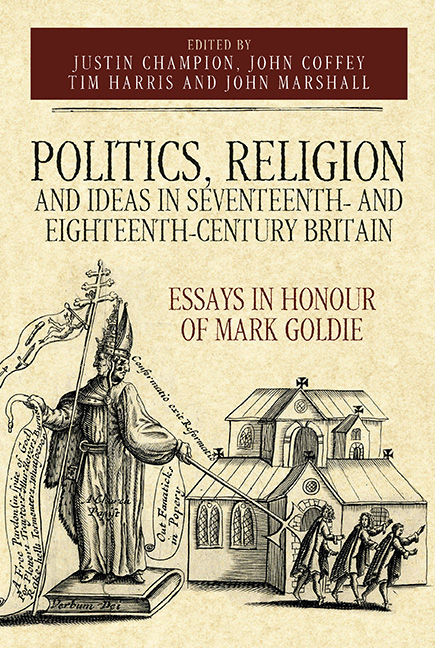 Politics, Religion and Ideas in Seventeenth- and Eighteenth-Century Britain
Politics, Religion and Ideas in Seventeenth- and Eighteenth-Century Britain Book contents
- Frontmatter
- Dedication
- Contents
- Notes on Contributors
- Acknowledgements
- Notes on Text
- Abbreviations
- Introduction: Mark Goldie – An Appreciation
- 1 Constitutional Royalism Reconsidered: Myth or Reality?
- 2 Teaching Political Thought in the Restoration Divinity Faculty: Avant-Garde Episcopacy, the Two Kingdoms and Christian Liberty
- 3 Violence, Protest and Resistance: Marvell and the Experience of Dissent after 1670
- 4 Bulstrode Whitelocke and the Limits of Puritan Politics in Restoration England
- 5 The Assassination of Archbishop Sharp: Religious Violence and Martyrdom in Restoration Scotland
- 6 Compassing Allegiance: Sir George Mackenzie and Restoration Scottish Royalism
- 7 Corruption and Regeneration in the Political Imagination of John Locke
- 8 Locke the Censor, Locke the Anti-Censor
- 9 London, Locke and 1690s Provisions for the Poor in Context: Beggars, Spinners and Slaves
- 10 The Reception of Locke's Politics: Locke in the République des Lettres
- 11 Court Culture and Godly Monarchy: Henry Purcell and Sir Charles Sedley's 1692 Birthday Ode for Mary II
- 12 Thanksgivings and the Signs of the Times: The Apocalypse in the Long Eighteenth Century
- 13 The ‘Secret Reformation‘ and the Origins of the Scottish Catholic Enlightenment
- 14 The Surprising Lineage of Useful Knowledge
- 15 The Vicissitudes of Innovation: Confessional Politics, the State and Philosophy in Early Modern England
- A Bibliography of the Writings of Mark Goldie
- Index
- Studies in Early Modern Cultural, Political and Social History
- Tabula Gratulatoria
6 - Compassing Allegiance: Sir George Mackenzie and Restoration Scottish Royalism
Published online by Cambridge University Press: 12 October 2019
- Frontmatter
- Dedication
- Contents
- Notes on Contributors
- Acknowledgements
- Notes on Text
- Abbreviations
- Introduction: Mark Goldie – An Appreciation
- 1 Constitutional Royalism Reconsidered: Myth or Reality?
- 2 Teaching Political Thought in the Restoration Divinity Faculty: Avant-Garde Episcopacy, the Two Kingdoms and Christian Liberty
- 3 Violence, Protest and Resistance: Marvell and the Experience of Dissent after 1670
- 4 Bulstrode Whitelocke and the Limits of Puritan Politics in Restoration England
- 5 The Assassination of Archbishop Sharp: Religious Violence and Martyrdom in Restoration Scotland
- 6 Compassing Allegiance: Sir George Mackenzie and Restoration Scottish Royalism
- 7 Corruption and Regeneration in the Political Imagination of John Locke
- 8 Locke the Censor, Locke the Anti-Censor
- 9 London, Locke and 1690s Provisions for the Poor in Context: Beggars, Spinners and Slaves
- 10 The Reception of Locke's Politics: Locke in the République des Lettres
- 11 Court Culture and Godly Monarchy: Henry Purcell and Sir Charles Sedley's 1692 Birthday Ode for Mary II
- 12 Thanksgivings and the Signs of the Times: The Apocalypse in the Long Eighteenth Century
- 13 The ‘Secret Reformation‘ and the Origins of the Scottish Catholic Enlightenment
- 14 The Surprising Lineage of Useful Knowledge
- 15 The Vicissitudes of Innovation: Confessional Politics, the State and Philosophy in Early Modern England
- A Bibliography of the Writings of Mark Goldie
- Index
- Studies in Early Modern Cultural, Political and Social History
- Tabula Gratulatoria
Summary
In his seminal article on ‘John Locke and Anglican Royalism’, Mark Goldie warned scholars to beware axiomatic assumptions that ‘great philosophers only reply to leviathans and other sea monsters, and not to shoals of smaller, but no less dangerous fish’. With regard to Locke's Two Treatises of Government (1689), Goldie persuasively argued that Locke's motivation in dissecting Filmerian absolutism stemmed from dismay at the readiness with which ideas once regarded as extreme in the 1640s had seemingly achieved mainstream acceptance a generation later. In characteristically alliterative and succinct prose, Goldie emphasised the importance of recognising that multiple pens had produced ‘the suffocating plethora of polemic spawned by the triumphant Royalism of the Restoration’. Appearing three centuries after Oxford University's convocation had negatively defined the tenets of Restoration royalism by staging a public book-burning in July 1683 that consigned to the flames works endorsing popular sovereignty, contractual government, elective monarchy and rights of resistance, Goldie's article also drew attention to parallel events outside England. For Goldie, ‘nothing illuminates more the sectarian orientation of Restoration politics than the affairs of Scotland’, where sectarian strife and radical Presbyterianism ensured that ‘English religious rancour seems urbane by comparison’.
Pursuing Goldie's piscatorial imagery, this essay reconsiders a large fish in a relatively small pond: Sir George Mackenzie of Rosehaugh (c. 1636–91), often cited by Goldie as exemplifying late seventeenth-century Scots royalism. As well as serving as Charles II and James VII & II's lord advocate, Mackenzie sustained an extensive published output encompassing political theory, jurisprudence, moral philosophy, Scottish history, witchcraft, forensic rhetoric, witchcraft and imaginative literature, with the majority of his works republished in lifetime and posthumous editions. Among his contemporaries, Mackenzie's colleague at the Scots bar, Sir John Lauder of Fountainhall, acclaimed him as simply ‘the brightest man in the nation’ and, outside Scotland, Mackenzie's works were owned and cited by, among others, Abraham Cowley, William Davenant, John Dryden, John Evelyn, Johannes Graevius, John Locke, Samuel Pepys and William of Orange. In popular culture, however, Mackenzie's reputation remains the ossified prisoner of Presbyterian partisanship. Referred to as ‘Bluidy Mackenzie’ by Sir Walter Scott in The Heart of Midlothian (1818), the lord advocate's sobriquet became synonymous with the ‘Killing Times’ delineated in nineteenth-century Whig martyrologies which denounced the brutal suppression of Presbyterian nonconformists by servile Stuart sycophants.
- Type
- Chapter
- Information
- Politics, Religion and Ideas in Seventeenth- and Eighteenth-Century BritainEssays in Honour of Mark Goldie, pp. 121 - 140Publisher: Boydell & BrewerPrint publication year: 2019


